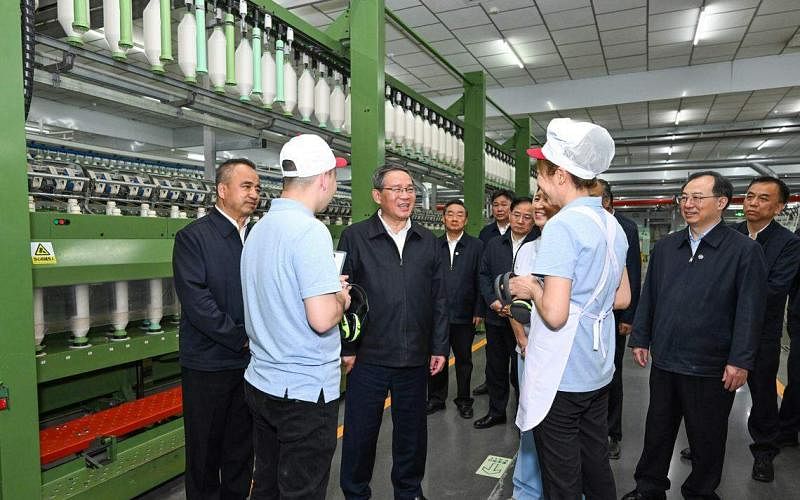The United States has recently put pressure on China over the forced labor issue in Xinjiang Chinese Premier Li Qiang visited Xinjiang for three days this week. strengthen international exchanges, and build a bridgehead to open up to the west. Li Qiang also investigated the subsidiary of Esquel Group, a long-established textile company that has been licensed by the United States for four years.
Scholars interviewed analyzed that Li Qiang’s study of textile companies sanctioned by the United States was intended to confirm and recognize the legitimacy of these companies operating in Xinjiang, it also showed that Xinjiang’s openness to the outside world remains unchanged when the United States States are playing the “human rights card” again.
Li Qiang, together with Ma Xingrui, Party Committee Secretary of the Xinjiang Autonomous Region of the Communist Party of China and others, visited Xinjiang from Tuesday (May 7) to Thursday (May 9). This is also Li Qiang’s first visit to China’s western region after Chinese President Xi Jinping held a conference in Chongqing on April 23 to make new arrangements to promote the development of the western region.
Li Qiang visited Urumqi, the capital, Changji Hui Autonomous Prefecture in the north central part of the country and other places, when he studied the production and research and development of many companies, including agriculture, clothing, technology, energy and chemicals, including Changji Esquel Textile, which was licensed by the United States.
Changji EsquelIt is a subsidiary of Esquel Group, a long-established Hong Kong textile company and one of the largest shirt manufacturers in China, opened in Xinjiang In mid-2020, it was brought into the entity list of the “Uyghur Forced Labor Prevention Act” by the US Department of Commerce, causing Esquel to lose a large number of European and American customers.
Footage broadcast by China Central Television’s “Xinwen Lianbo” on Thursday evening showed that Yang Minde, the chairman of Esquel Group, was with him and explained to Li Qiang. Li Qiang expressed support for initiatives to increase investment in research and development, accelerate the accumulation and replication of technology, and win the initiative in market competition. He called for deeper cooperation between eastern, central and western China to ensure national food security, energy resources and important industrial and supply chains.
Before that,US Secretary of State Anthony BlinkenBefore visiting China on April 24, he delivered a speech in Washington, calling the victims of Chinese Uyghurs “genocide”.
At a congressional hearing on April 30, US Department of Labor officials called on international companies not to continue operating in Xinjiang, saying concerns about forced labor remain unresolved. Reuters reported that China’s Ambassador to the United States said on the same day that the allegations of forced labor were “just lies concocted by the United States in an attempt to suppress Chinese companies.” -sudden.”
The latest study released by the US testing agency on Tuesday showed that the US ban on Xinjiang products appears to be ineffective Currently, 19% of cotton products sold by consignment still contain traces of Xinjiang cotton -US sales and e-commerce platforms.
Yao Shujie, a professor of economics at Chongqing University, pointed out in an interview with Lianhe Zaobao that Li Qiang’s investigation into textile companies sanctioned by the United States was aimed at confirming and recognizing the legitimacy of these companies. worked in Xinjiang days, showing that he placed great emphasis on the Development of Xinjiang.
Since taking office as Premier of the State Council last March, Li Qiang has made at least 14 research trips to Beijing and visited 17 provinces and municipalities, including five provinces in west and cities such as Sichuan and Chongqing. Most of Li Qiang’s local research lasted one or two days.
Li Qiang also called on Xinjiang this week to connect inland areas with countries along the “Silk Road Economic Belt”, promote deeper economic and trade cooperation, increase the operation of China’s freight trains -Europe as a main channel, and to create a good business ecology. .
Yao Shujie analyzed that Xinjiang is an important export for the “Belt and Road Initiative” and the China-Europe Railway Express, and is also a major trade channel for China’s exports to Central Asia, East Europe and elsewhere. During Xi Jinping’s visit to Europe this week, he signed several agreements with Hungary in Eastern Europe, covering railways, highways, the automobile industry and other areas, which are expected to bring more benefits to the development of Xinjiang.
Yao Shujie pointed out that Xinjiang has a large land and great potential for agricultural development. As local wars continue around the world, China is increasing the development of Xinjiang not only for economic interests, but also to ensure national strategic security such as food and energy. .
2024-05-10 14:34:00
#emphasizes #investigating #Xinjiang #investigating #textile #companies #licensed #United #States


